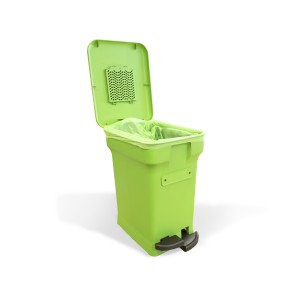Store Compost Without Attracting Fruit Flies
CompoKeeper started as an answer to a smelly problem created when Boulder, Colorado adopted a municipal composting program. The municipal composting program was a well-intentioned effort to reduce waste going to the local landfills, which are expensive to build and maintain so that they don’t contaminate local groundwater, but like so many well-intentioned efforts, there were unintentional consequences.
The city handed out gallon-size plastic pails in which to collect organic waste in the kitchen. From there, the food scraps were to be taken to a curbside bin, where it was collected along with yard waste, recyclables and ordinary trash. The food scraps and yard waste went to a composting facility where it was turned into soil and distributed to local gardeners and various environmental rehabilitation projects. “My family was excited about it,” says Kristen Hess, Brand Manager and Co-founder of CompoKeeper. “What we found was that it was getting stinky in the kitchen, and also fruit flies were becoming a pain in the neck.”
The smell, the flies and the frequent trips outside to empty the small pail into the collection bin became obstacles that outweighed all the good intentions. “It wasn’t long before we stopped doing it – we stopped composting our food scraps,” Hess says.
Her dad, Van Hess, decided to do something about the situation, so he went to work on a bin system that would solve all the problems at once. It would be bigger than the small pail issued by the city. There would be no smell, and it wouldn’t breed fruit flies. “He found that he wanted the compostable bag to stay sealed when it wasn’t in use, but he didn’t want to use his hands to tie it and untie it, so he built clamps into the bin that are opened and closed with a foot pedal. Since the bag is sealed, odors are contained, and fruit flies are no longer an issue,” Hess says.
A Kickstarter campaign to raise funds to go into production didn’t raise enough pledges to give the Hesses their seed money, but it got noticed and people became interested enough to help the Hesses raise enough money to build a prototype. They also offered their ideas for improving the product, Hess said. “We made it better looking, added a bag tray to make it easier to extract the bag, added a charcoal filter,” Hess says. A local pitch slam in which entrepreneurs offered investment proposals to potential funders attracted an investor who put up enough cash to buy the necessary tools.
CompoKeeper went onto the market in September 2014, and it has continued to draw interest as more people have the opportunity to participate in municipal composting projects. CompoKeeper is currently available for $99.50 on the company’s website, and Sam’s Club has picked it up for a test run. The product is also available locally in Boulder and will be available online on Bed Bath & Beyond’s website this spring. The company is making its second appearance at the International Home + Housewares Show this year, and CompoKeeper is made in the USA. For further information, visit www.compokeeper.com.
This story was originally published in the March 2015 issue of Kitchenware News, a publication of Oser Communications Group.


You must be logged in to post a comment.